“Survive, bunny” A girl left messages on the wall in Mariupol. They were found by a builder in occupation a year later. See here:
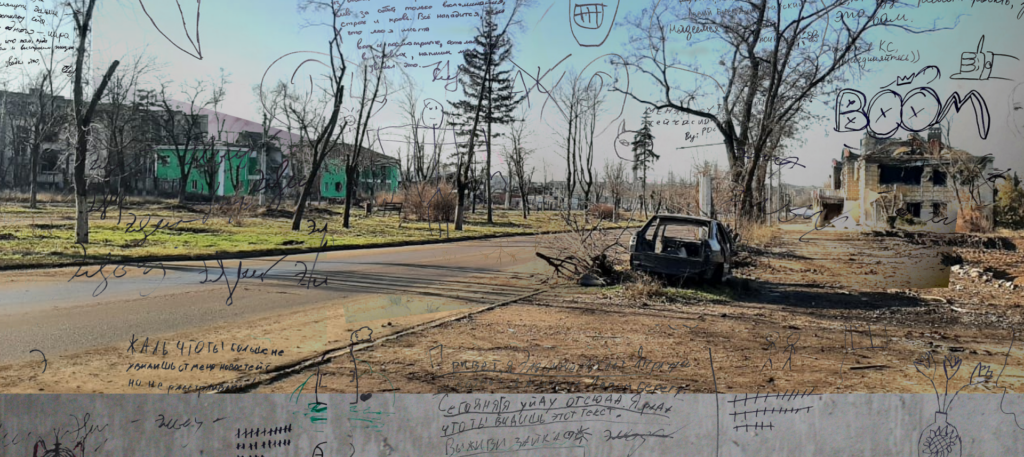
Alexey and Nata don’t know anything about each other. They read different news, listen to different music, their realities practically do not intersect. Student Natalya left for Poland in the spring from Mariupol, “captured by a terrorist country,” as she says. Builder Aleksey arrived from Russia in the summer “to liberated from the Nazis” Mariupol, as he says. In the basement of the university, he found walls covered with messages and drawings, where dozens of children and teenagers were hiding from shelling. Alexei and Natalia will never meet because they are from different worlds. The Village special correspondent Maria Semenova recorded their stories.
This is the second part of a cycle about builders in occupation. The first part is about the very first builders of Mariupol after the capture. The third part is the stories of builders from Central Asia, who are now also going to the occupation through Russia.
IMPORTANT. Quotes in this article may cause outrage or repeat propaganda theses – we publish them without distortion, but with notes about the content. Quotations do not reflect editorial position. THE VILLAGE IS CLEARLY AGAINST THE WAR AND THE RUSSIAN INVASION. At the same time, we continue to monitor the phenomena that war creates and record the testimonies of the participants, including the occupation. IF YOU CLOSE FROM EVIL, YOU WILL STOP UNDERSTANDING HOW IT BECAME POSSIBLE.
The illustrations used are authentic photographs taken in the winter of 2022.
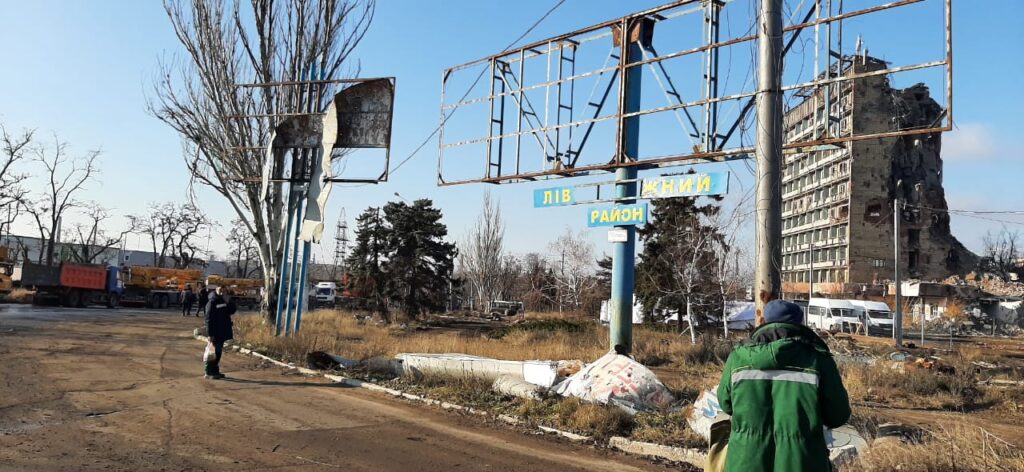
1. If there are no further entries, we got out
The walls of the basement floor of the Azov State Technical University in Mariupol are drawn with a marker: there are flowers and cats, poems and just notes. Different dates, but all – March 2022. The people who hid here from shelling tried to leave some kind of memory of themselves – not knowing for sure if anyone would see their notes.
“Hi, I’m Elya, I’m 9.5 years old. I hide from the war, I live on the Left Bank. I’m leaving here today. I’m glad you see this text. Survive, bunny”, “Dina, 16 years old, Marik, Left Bank, Leningradsky. We hope that we will survive”, “Those people who lived here: special thanks to you for your help and memories!”, “My name is Rostik, I am 11 years old, now there is a war, well, nothing)”. Several inscriptions belong to Natalia – in February 2022 she was in the 11th grade, preparing to enter the medical university here in Mariupol: “Hi, I’m Nata, today is March 19, 2022. 24th day of the war. This story will end, leaving behind only memories, fear and blood. Everything will work out, if anything, my insta … – so look if I’m still alive.
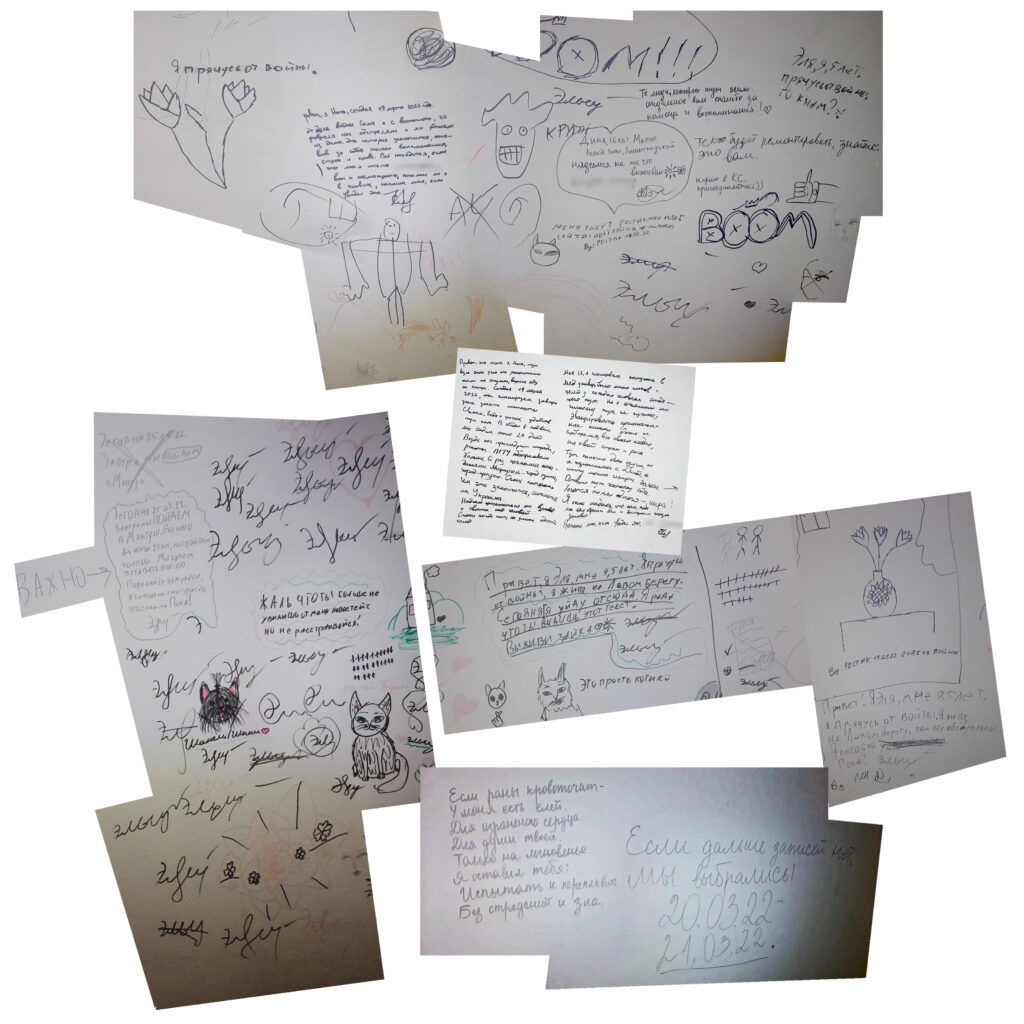
“Hi, it’s me again, Nata, here we settled down near this corner, slept on chairs, cooked food on a fire. Today is March 19, 2022, we are planning to leave tomorrow at last. Light, water and other amenities are not here. In general, we sit in the basement for about 24 days. Everywhere we are pursued by shells, rockets. PSTU was fired more than 6 times with direct hits. Mariupol is a ruin city, a ghost town. It is very interesting how this will end, whether Ukraine will remain. Tired of waking up from an explosion and a whistle overhead. There are no glasses anywhere, it is wildly cold outside.
I am 17, I planned to enter the medical university, there were many plans and goals for every person sitting here. But, unfortunately, no one needs us here. No one was even going to officially evacuate us, all on their own, at their own peril and risk. Here, of course, wildly boring, but I met Dina. I want only one thing – peace! I really hope that where we are going, we will find a home and build a life.”
On February 23, the day before the war, the authorities announced a training evacuation, the children were taken to the basements, Natalya tells The Village: “There was nothing surprising in this, it happens every year. No one even thought that the next morning we would not go to school, that they would start firing at us. I lived a calm, very good, rich life.
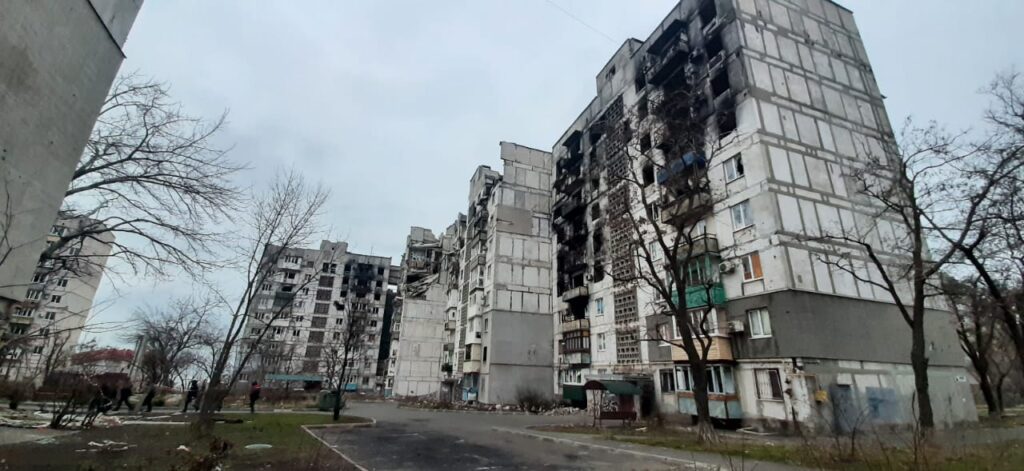
Even on February 24, Nata with her mother and older sister hoped that everything would work out: “I live at the end of the city, the Vostochny microdistrict. From there the attack began. Around 10-11 in the morning the shelling of my area began. Surprisingly, this time they fired at the same points as in 2015 (In January 2015, the Vostochny microdistrict in Mariupol was fired from multiple launch rocket systems, 31 people died, more than 100 were injured. – The Village). We thought that it would be like in 2015 – one day and it would all be over. Gathered things, everything you need. I took only jeans, a hoodie, a hat, a jacket. These things are still with me, evoke hard memories, so I have never worn them since the war.
We spent the night from February 24 to 25 at home under the wall in the corridor, surrounded by blankets and mattresses. It was impossible to go out even for 15 minutes, because it was very loud – you don’t know if it will fall into your yard or not. The next morning it was more or less quiet, we decided to pack up and go to my uncle, he lived in the same area, but maybe three or four kilometers away. I thought it wouldn’t get to him. And so, at my uncle’s, I go to the kitchen to make tea for myself, I see a flash, I fall to the floor. Arrived just the same in the yard. And then I realized that it would not be limited to my area,” recalls the girl.
Then they packed their bags again – Natalya periodically lived with her uncle, there were a lot of her things here – and went to the shelter. First, to the House of Culture, located nearby, and after 15 days they were transported from there to the university. We were supposed to go to the drama theater, but there weren’t enough places: “If we were settled in the drama theater, I don’t think I would communicate with you.” The drama theater was destroyed on March 16 as a result of a Russian airstrike. The city council of Mariupol announced 300 dead, the security forces of the DPR recognized only 14 bodies. After the capture of the city, the drama theater was demolished, now an objective investigation is physically impossible.
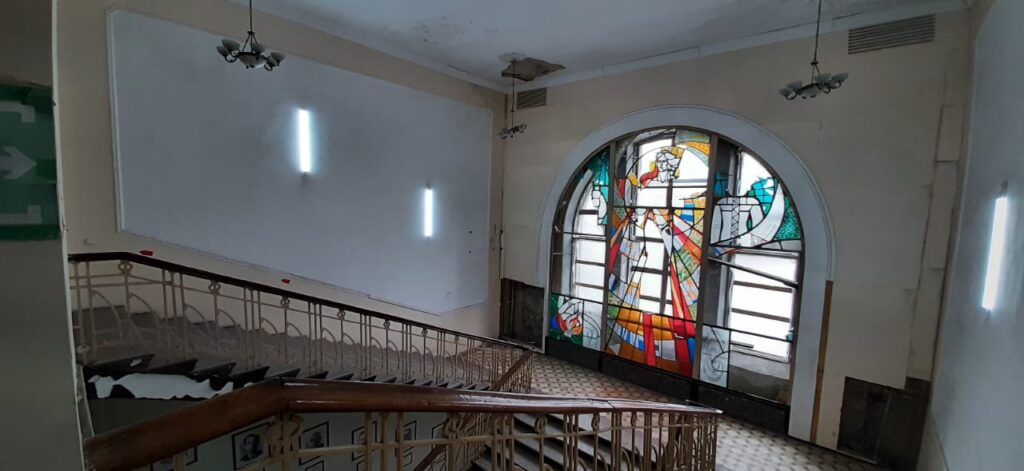
The university is located in the center of Mariupol. The first days of explosions were not heard. Natalya walked around the floors and looked for the right things. She took someone’s down vest, a marker and a notebook. She used to have a habit of keeping something like a diary in notes on her phone. But it was necessary to save the charge, so Natalia began to write in a notebook. And then he got lost, and the girl began to leave notes right on the walls.
They lived in the hallway on the basement floor. There weren’t enough beds, food ran out quickly. Initially, PSTU had a small food warehouse: pasta, peas, stew, corn: “My favorite food at that time and what I can’t eat at all now is soup. Water, pasta, sometimes carrots, peas or corn. At the time, it seemed so delicious!” the girl says.
With Natalia there was a cat Chita. Actually, this is a female name, but when the girl picked up Chita in the field, she thought for six months that it was a cat. For water, one had to run to the city garden, where one could draw water from a spring. Because of the shelling, it was not always possible to get out. Sometimes Natalya did not drink to leave the cat. When they cooked, I gave him half a serving.
“We took desks, put them together and slept on them, then they brought us mattresses from kindergartens. But I want to say that it didn’t help at all, because the desks are mega-hard, then for two months I couldn’t sleep normally on my sides: they hurt very much, I lay down. We were not fed at PSTU, because humanitarian aid was no longer allowed through. People went shopping and took whatever they wanted. I almost didn’t eat then – both from the fact that there was nothing to eat, and from the fact that stress and a piece didn’t go down my throat, ”she says.
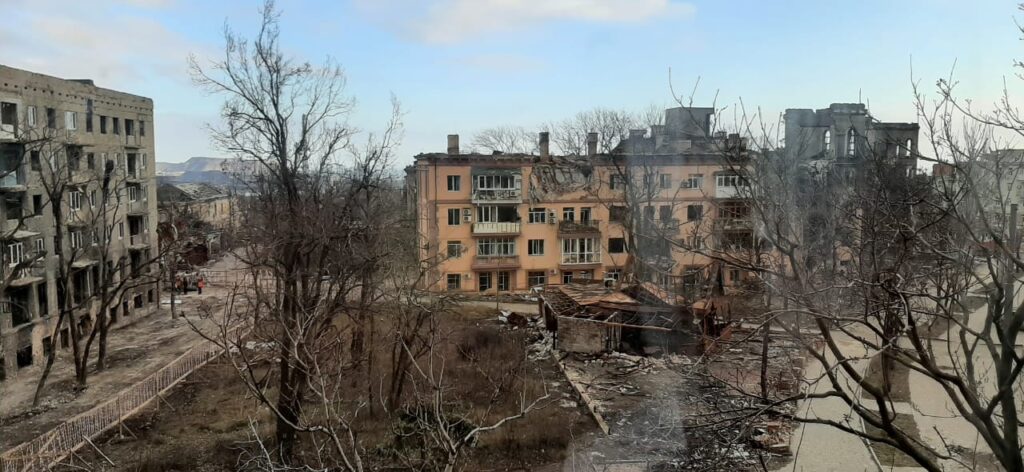
Once, during a foray into the store, she almost died: a bullet pierced a down vest, the same one that she picked up in the audience. The vest was voluminous and a couple of sizes too big. Natalya believes that her love for oversize saved her life: “I ran straight – it was my mistake. You can never run straight along a straight street, you need to zigzag. They shot at me, the bullet hit this vest and gutted it a little. It flew past me, but 5-7 centimeters to the right – that’s all. It would be…” she thinks, “liver, most likely.”
She stayed in the basement until March 21. The day before, a Ukrainian military man came to the shelter and said: “Get ready and leave at dawn, there will be close combat, and PSTU will simply not be.” At six in the morning, Natalya and her family went to the exit from the city – this is about 7 kilometers. In the hands of the bag, on the shoulder – the cat Chita. In the heel – a piece of glass, hit on the first day of the war. Not deep, but the girl herself could not pull it out, it was too painful to touch.
Russian soldiers were already standing at the exit from Mariupol, checking passports. I have “Mikhailivna” written in Ukrainian, and the soldier said: “Now only “Mikhailovna” and “Glory to Russia”. – Well, yes, think so further. How can I say that about a country that killed my friends?
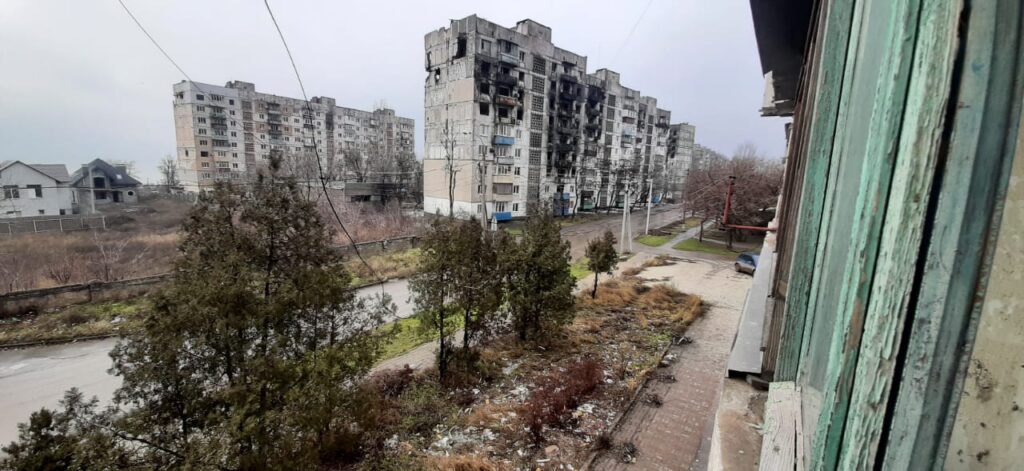
2. First he lied to his wife and mother
For the first time, Aleksey arrived in occupied Mariupol at the end of August: “There is native land, native air, native people.” He is an installer of ventilation and air conditioning, all his life he worked on a rotational basis. I saw on TV how the city was being restored, and I thought: “Why shouldn’t I go?” I came to the agency in Salavat, they said: “Of course, we will arrange for you, we have people working there, everything is calm, you can go.”
Alexei is a strange person. Originally from Ukrainian Nikolaev, he married a Russian woman from Bashkortostan, brought her to his homeland, closer to warmth and the sea. There, in Nikolaev, their daughter was born. But in 2014, Alexey and his family moved to his wife’s homeland, to Salavat. His grandmother remained in Nikolaev, and his mother lived in Kyiv. Alexey explains the reasons for his move as follows:
“I voted for Yanukovych, but my president was illegally removed! I was and still am against it. A revolution has begun, I have a wife, a small child. I think that I will sit, wait until they blow up or kill? (Hereinafter, we left Alexei’s speech unchanged, including politically incorrect turns of speech and propaganda theses. They do not reflect the position of the editors in any way. – Approx. ed.). We left, but I came to Ukraine every summer, I brought my daughter to rest. My mother and grandmother stayed in Ukraine. In 2014-15, they wanted Nikolaev to become Russia, they were waiting for this. And now my mother has changed her point of view and has become against Putin. He says: “Since Russia started bombing us, why do we need it?” My mother now lives in Kyiv, and my grandmother lives in Nikolaev. Recently there was a hit 300-400 meters from her house, the neighboring five-story building has developed. But my grandmother is still for Putin, she quarrels with her mother because of this, she watches Russian news, she worries. And my mother is glad that Kherson was returned, she rejoices, although she writes that she has no electricity and water in Kyiv.”
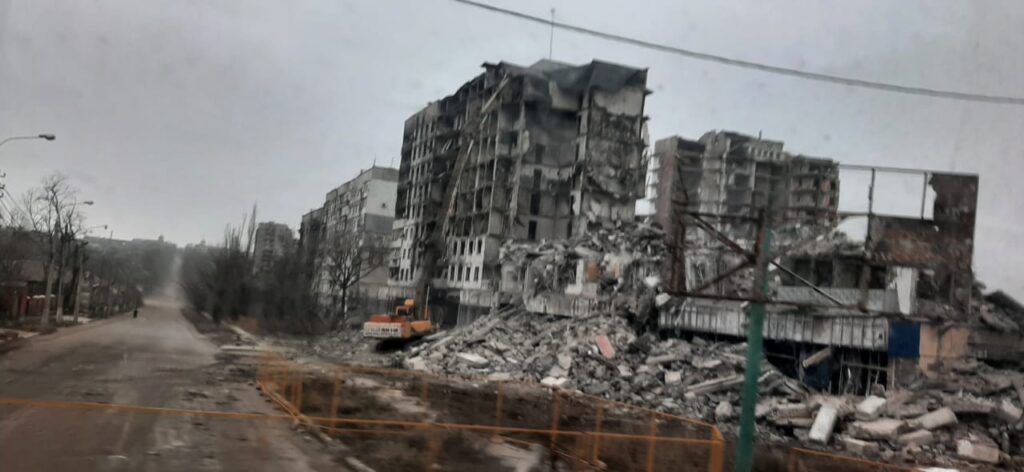
They drove to Mariupol at night from Volnovakha, it was a completely dark city, 80-90% of the houses were without electricity then: “Then in the morning, when all this devastation became visible, I looked and did not believe that this could happen, that it was true in me before my eyes. I came from a peaceful life to a war, to a destroyed, burned-out city. The bus takes us from work in the evening – we see bonfires burning in the yards, people are preparing dinner. We go in the morning and prepare breakfast. Crosses stand in the courtyards: just an ordinary courtyard, and two or three graves, ”he describes.
At first, he lied to his wife and mother (she lives in Kiev) that he went to the Rostov region so that they would not worry, but then they brought him to clean water: “I don’t know how to deceive.” Friends from Ukraine began to ask: “And then you will come to Nikolaev, to Odessa, will you take a machine gun?” “They blame the ordinary Russian, as if it were his fault that this happened. The attitude is: “You support Putin – that’s all, you are an enemy.” And I say: “Well, if they destroy Odessa and Nikolaev, I’ll go to restore it.” And what should I do, my cities, ”explains Alexey.
Alexei lived with other builders in a hostel on the outskirts of the city. The conditions are the same as on any other watch: bunk beds, a shower and a toilet on the floor, a dining room, a horizontal bar on the street. But there were always people in military uniform nearby, and at 21:00 the hostel was closed “for security reasons.” In September, 200-250 people lived in the construction camp. Masters were placed separately in a hotel, someone – in sanatoriums on the seashore.
There were no days off, but Alexei says that it’s not scary for him: “They promised 90 thousand a month, but because there were no days off, 120 came out. Everything was fast, noisy, I didn’t have time to read the contract. Who managed, they say, was supposed to be one day off. But my salary is higher as well.” In addition to Alexey, another employee told The Village that R-Stroy did not hand out contracts to employees.
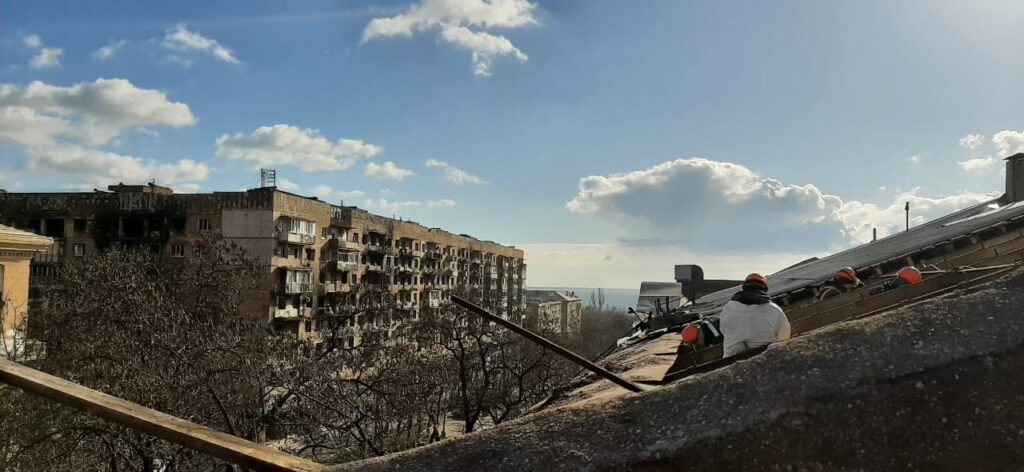
“Once they worked in Volnovakha. A couple of shells flew to the outskirts, we were told: “Citizens of Russia, we are leaving urgently,” says Alexei. Do not sit in the hostel, we were sent to work in a school in Mariupol, to the guys from our own company: they dismantled the plaster, hollowed out the floor. The guys told me that the principal of the school told them: “Why did you come here? They lived well before you, but you arranged this. The roof was broken in the school, there was a small fire, there was no glass. I would say there are no windows in the whole city. The most demanded professions there are roofers and window makers,” says Aleksey.
In Mariupol he worked for three days. Around the school, which he was repairing, there were burnt 9-story skeletons: “Black windows, in the evening there is not a light, not a single living soul.” The movement on the streets appeared, according to Aleksey, when there was a referendum on joining Russia – a polling station was made at the school: “In Mariupol in the evening there is usually no one on the streets at all, and in the afternoon children ride a bicycle, mothers walk with strollers, there are queues to the store, by mail. Little by little the cities began to come to life. We had good relations with the locals. But the tired look of people, the imprint of some kind of torture. The same expression in women and men – as if they were betrayed.
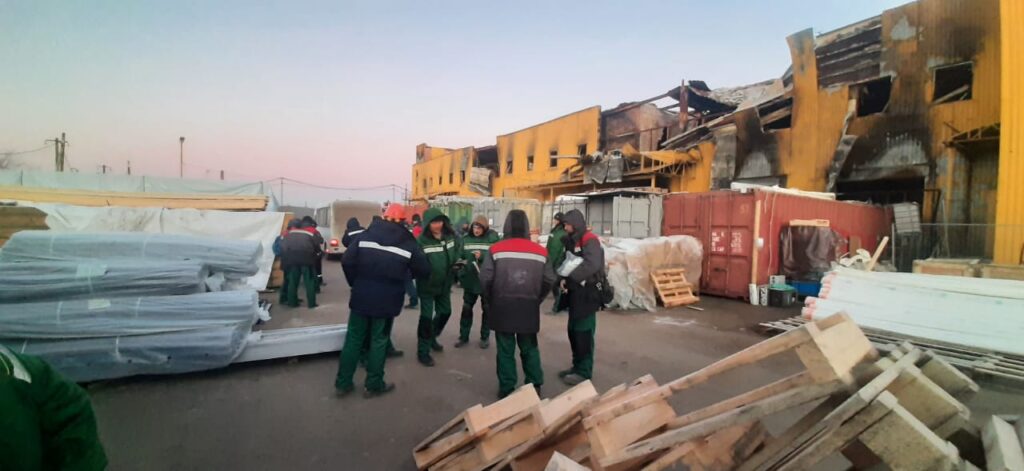
Shortly after Aleksey first arrived in Mariupol, mobilization began. The builders collected the data of military tickets – “so that they would not send us summonses.” But Aleksey says that he is “not afraid of mobilization”, and it is almost impossible to understand his logic further: “If they call me, I will not go. How will they send me to fight against the Ukrainians? I’d rather go to jail. I will not fight either with the Russians or with the Ukrainians; with the Germans, maybe he would have fought. This is not my war.”
“But I support what is happening, although I would not like it,” Alexey continues. “Putin was simply left with no choice. (Hereinafter, Aleksey repeats the theses of propaganda again. They do not reflect the position of the editors in any way. – Note ed.) Nobody listens to our country, does not want to talk. And now Putin will not listen to anyone. He waited 8 years, gave a chance, wanted to negotiate. In general, I am completely on the side of Russia,” he says.
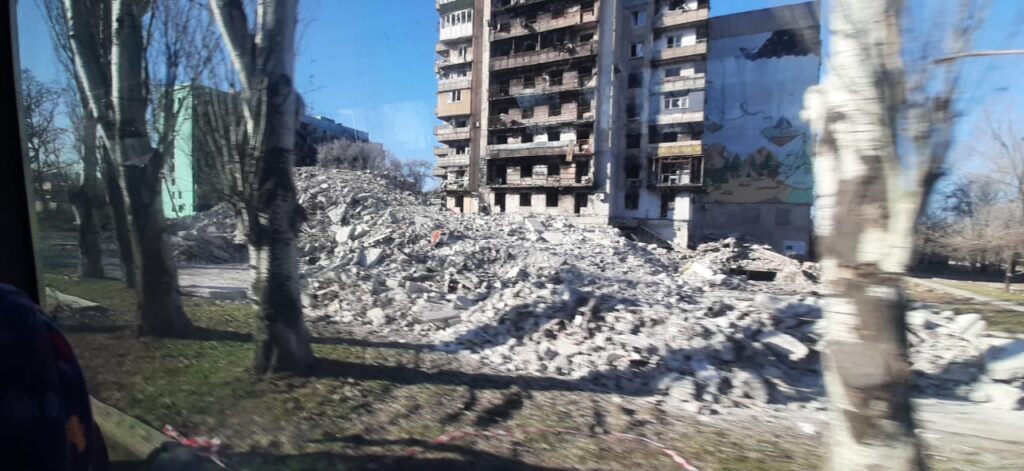
3.
Having got out of Mariupol, Nata and her family went to Berdyansk, from there on an evacuation bus to Zaporozhye: “It was probably the toughest road in my life. In normal mode, by bus, it takes 4-5 hours. We drove for four days. 60-70 people, people just sat on each other’s heads. It’s stuffy and hard. There were about 20 checkpoints, at each one we were taken out of the buses, the men were undressed, our phones were checked. We checked Telegram for keywords, entered “Putin”, “war” into the search and looked at what people wrote. I was lucky because I no longer had Telegram: I deleted all energy-intensive applications, ”she says.
From Zaporozhye, the girl left by train to Lviv, and from there to Poland, to a young man, he was originally from Mariupol, but left to work before the war.
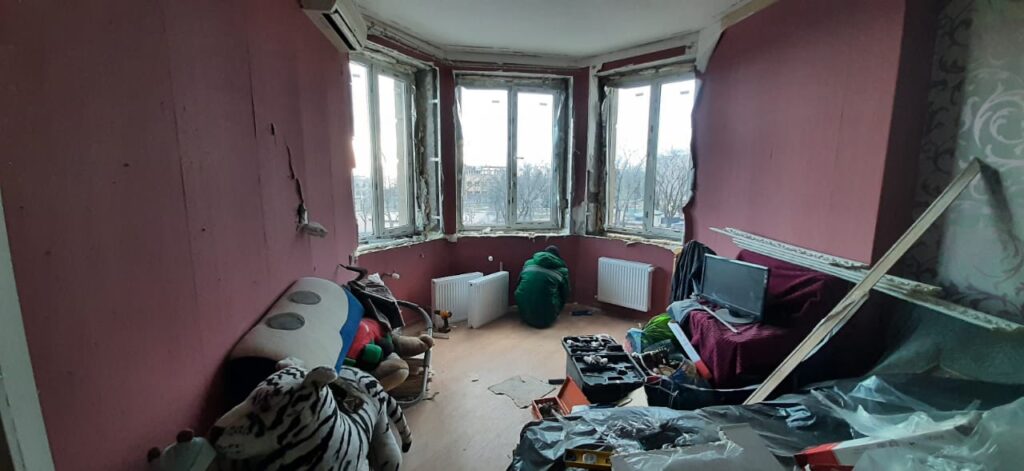
4.
After resting on vacation, in December 2022, Alexey returned to Mariupol again. He likes that the winter is warm, but the salary is the same as in the cold northern shifts. In February, Aleksey was doing repairs at the same university – and came across notes left by the Ukrainians during the hostilities. Among them are Nata’s messages: “These messages were written by a girl who survived the war within the walls of the university. These are especially touching,” with such a message he sent pictures to The Village. The building survived – now he is updating the decoration there.
Prior to that, Aleksey changed heating systems in residential buildings. To do this, it is necessary to replace the radiator in each apartment, so he communicates a lot with Mariupol residents – or rather, with a fifth of the townspeople, because all the rest fled the city or died: “Four people live in one entrance, one person lives in another, and nobody at all , in the next – a mother and son, they have all the keys to all the apartments. And some apartments without doors – vomited with an explosion. Housing keeps people, they are not afraid of cold or hunger. Looking after other apartments. And as soon as the frost subsides, in April, most will return here and live. Someone does not want to speak at all or responds coldly, but most are in a good mood. All the same, windows were put in for them, some repairs were made, the doors were changed, batteries. There was a job for them. I asked the local workers – 55-60 thousand salaries, which is very good by Mariupol standards. They come to us, they understand that you will not find a normal job. I, too, if I lived in Mariupol, would go to restore my city.”
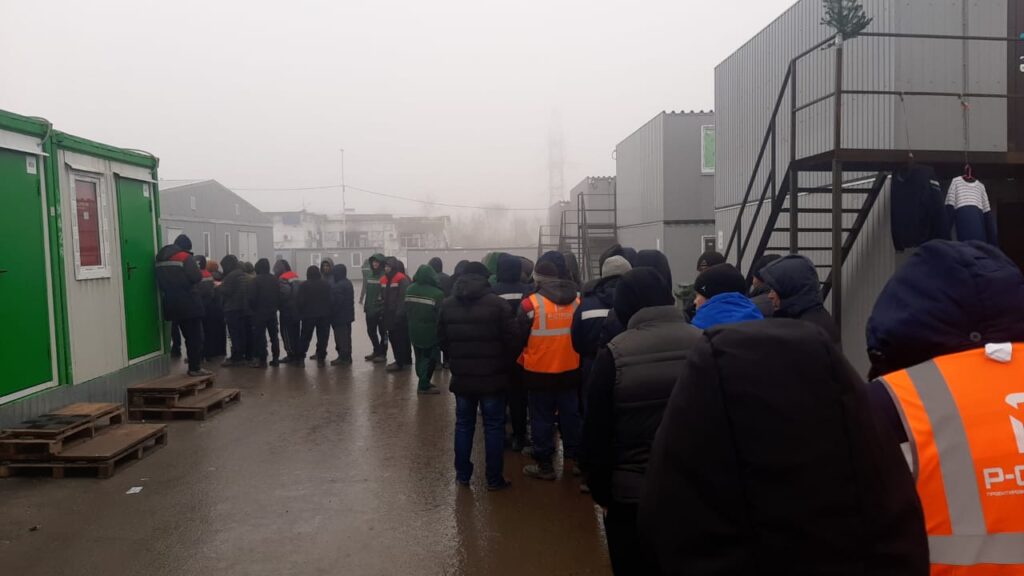
Aleksey says that there are much more builders, and now they are not only Russians: “About a thousand people already live in the car-city: from Kazakhstan, Belarus, Uzbekistan, Kyrgyzstan, but most are Russians. There are many women workers. Aleksey assesses the level of danger in Mariupol as average. Here you need to walk only along the beaten paths, so as not to be blown up, to stay farther from the houses: there is a danger that something will fall off, or the wind will blow off the old sheet or slate from the roof. Aleksey admits that some of the builders leave immediately after 2-3 days: “It is psychologically difficult for them.”
“In my memory there were no conflicts between the locals and us. I asked the roofer, a young guy: “You have a Ukrainian passport, why don’t you change it?” – “I don’t want it yet.” Maybe he is afraid that suddenly Ukraine will return back, and he will have a Russian passport. Most do not want to, they remember what the national battalions did here. Of course, the DPR and LPR also sometimes behaved badly, but they say they are better than the Ukrainian battalions,” Alexei sincerely believes in this propaganda, although Mariupol has always been a predominantly Russian-speaking city, and the eternal flame is one of the main sacred symbols for the current Kremlin – no one extinguished.
What the Russian invasion did to Mariupol – and what you can read about it in Russian
There is no official data on the number of dead civilians in the city. At the end of May, when the Russian military captured Mariupol, the city’s Ukrainian authorities said that at least 25,000 people had died during the siege. Associated Press respondents, citing workers documenting the collection of bodies from the streets for Russian authorities, say the death toll could be three times that. The Russian authorities did not give their assessments. Before the war, about 500 thousand people lived in the city.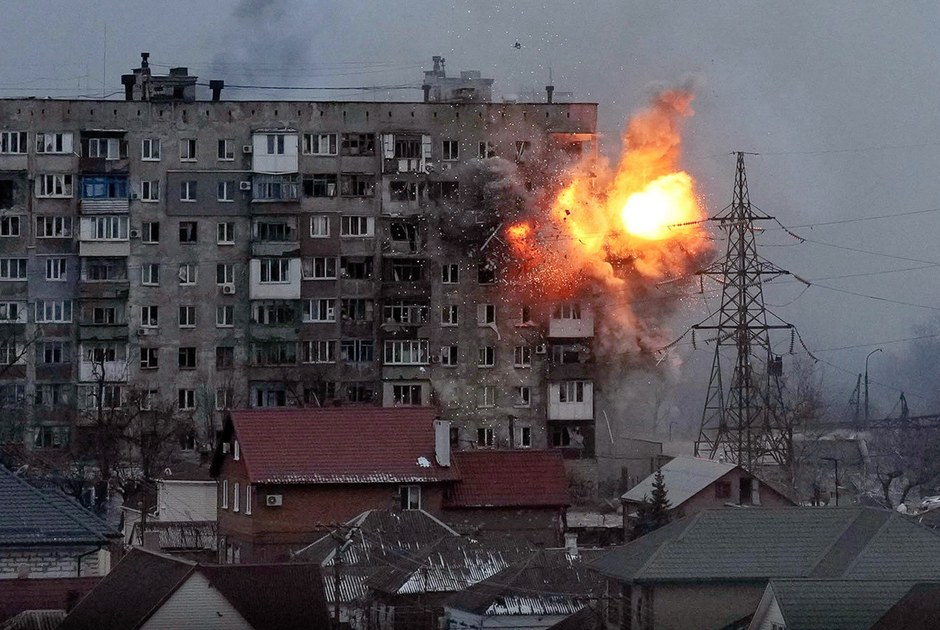
How in Mariupol they buried their relatives and neighbors right in the courtyards of high-rise buildings, Meduza (the Russian authorities consider it an undesirable organization) told, having selected and collected not only the biographies of five people buried in street graves in different parts of the destroyed city, but also searched for those who buried with his own hands. You can find the text in Google on the request “MARIUPOL GRAVE MEDUZA“, the title of the article begins with a quote.
From the first days of the war, hundreds of civilians hid in bomb shelters under the Azovstal metallurgical plant. When Russian troops almost completely captured Mariupol, the plant remained the last bastion where the fighters of the Armed Forces of Ukraine and the Azov regiment held the line, and at the same time the main target of Russian weapons. Kholod tells the stories of Mariupol residents who were locked in Azovstal’s underground bunkers and survived two months of bombing.
An air bomb was dropped on the Mariupol Drama Theater on March 16, 2022. How many victims and how many people took refuge in the building is still not known exactly: the city authorities stated that almost 300 civilians died in the theater, the AP agency – up to 600, Amnesty International confirmed 12 people, but with a note that the victims “probably much more”. After the capture of the city, the drama theater was demolished, now an objective investigation is physically impossible. But this period of destruction in the spring of 2022 is best described by a film by photographer Mstislav Chernov.
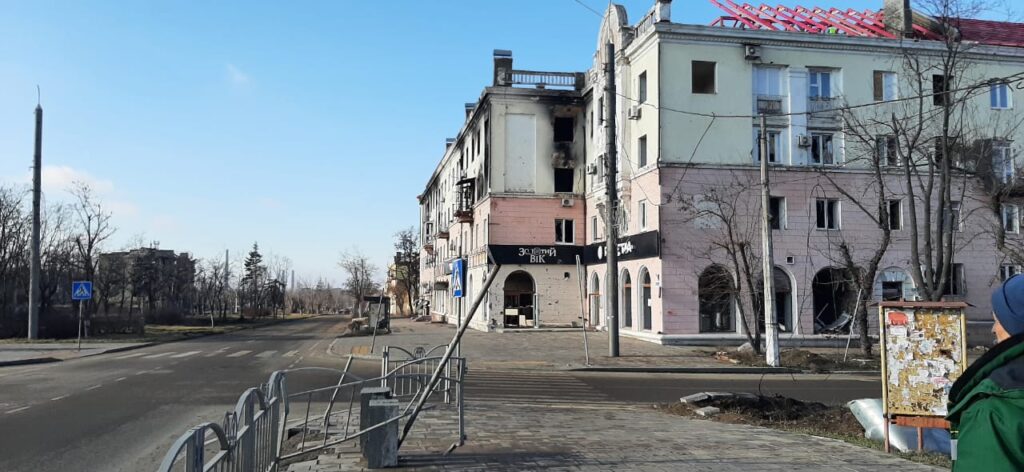
Alexei’s mother, who lives in Kyiv, does not know that he again went to the occupied territory – she thinks that her son is on duty somewhere near Vladivostok. The wife let go: “She knows that this is my homeland.” Only asked for a short time, for two months. But Aleksey decided to stay for the third month, and then return to Mariupol again, until May: “I recently heard on the news that they are going to build a base for the Black Sea Fleet here, so there is a lot of work here, as they say, for 5-7 years. I dream of returning back to Nikolaev if it becomes Russian. The main thing is that it should not be destroyed, like Mariupol, I worry about it,” sums up the builder in the occupation.
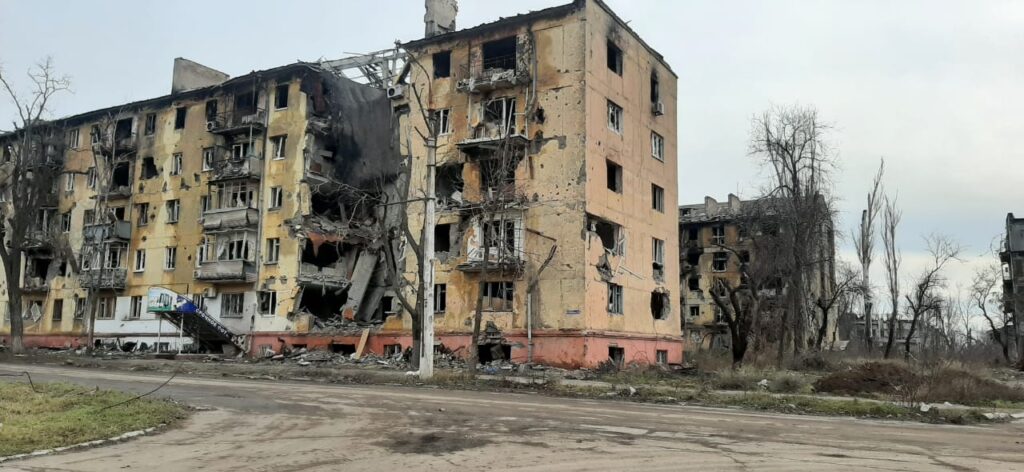
5.
While Mariupol is occupied, Nata sees no way to return there, although her house has survived: “My yard is a square of nine-story buildings. And it is precisely these nine-story buildings of ours that seem to be surrounded by God – I have fallen in love with this phrase lately – because everything around is bombed, and this courtyard is more or less intact. There are hits, the glass is broken, but intact. Now my uncle lives in our apartment,” says Nata.
Her mother and sister want to return to Mariupol in the near future. They live in a hostel, receive humanitarian assistance, but have not been able to settle in a foreign country: “Mom is almost 60 years old, it is hard for her in a foreign country with a foreign language, where there is nothing of her own. She wants to go home and do something there. She hopes that Mariupol will be Ukraine again, but this is a double-edged sword: when she comes home, there will be military operations again, God forbid. How will she be there without me?
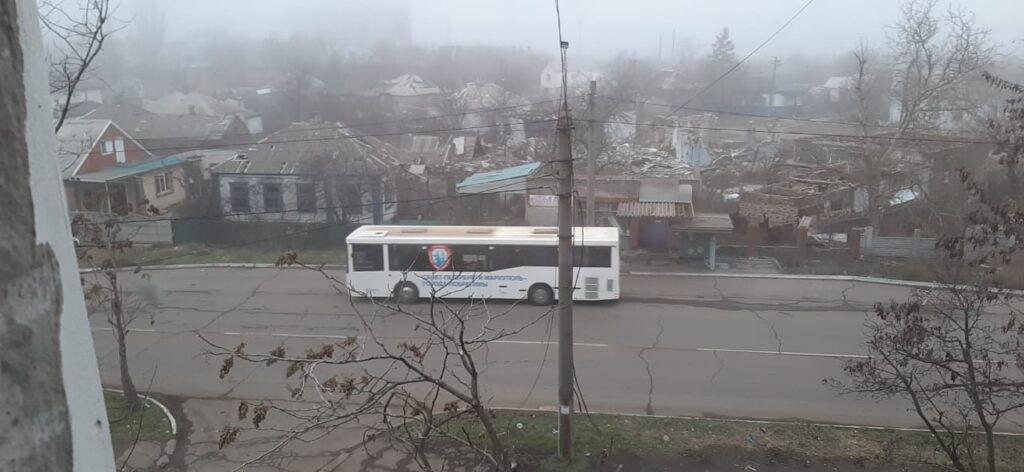
Original article from www.the-village.ru – Prepared in English by John Gather
